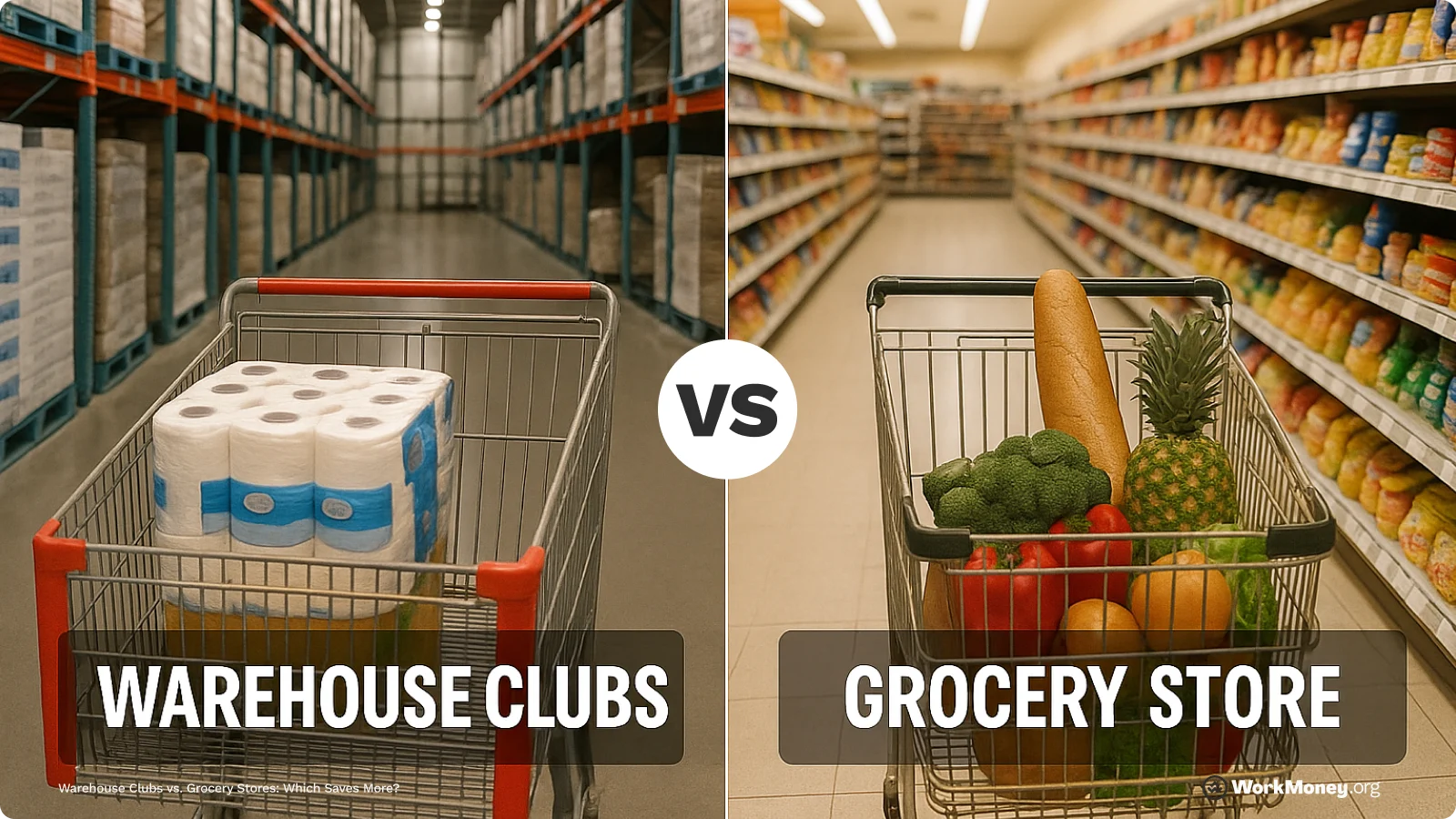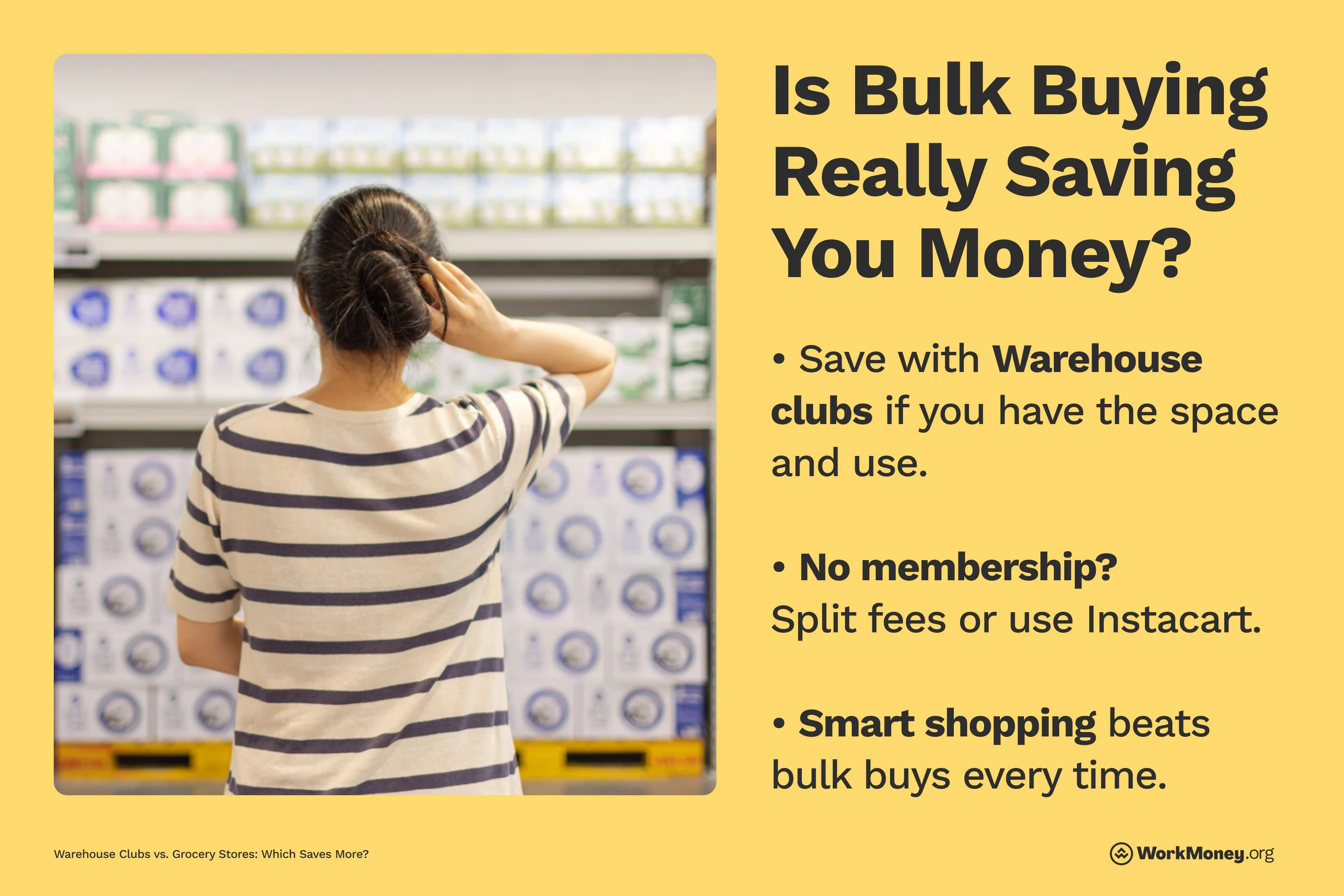Warehouse Clubs vs. Grocery Stores: Which Saves More?
Wondering if Costco or Sam’s Club saves you more than your local grocery store? Here’s how to compare costs, avoid waste, and make the smartest choice for your budget.


Membership Costs & Accessibility
It remains a hotly debated topic for deal-hungry consumers: do warehouse clubs really save consumers money? Those in favor swear purchasing in bulk brings costs down, especially when buying private-label items like Costco’s Kirkland Signature or Sam’s Club Member’s Mark. Those who shun paying the membership fee don’t think the overhead justifies the potential savings, especially those living alone.
For those who can afford to invest in a membership, you may be surprised at the potential savings by even only going a few times per year. If you’re on a tight budget, there are still ways for you to take advantage of the perks of warehouse club products.
How To Get Warehouse Club Access for Less
There are several ways to get access to warehouse clubs. Keep in mind that each brand has its own unique rules, so be sure to check how each one operates. Here’s what you need to know:
Go with a friend with a membership.
If a membership includes two members (like Costco), consider splitting the annual fee with someone.
Have someone with a membership purchase you a gift card. If you have a valid gift card, you can get in without your own membership.
Order from delivery services like Instacart. Keep in mind that prices through Instacart may be different than prices in the store.
Instacart sometimes runs promotions where you can get groceries for less than in-store, and have them delivered to your door.
Price Per Unit: Bulk vs. Regular Quantities
Saving on a warehouse club membership can be straightforward, but netting real savings from buying in bulk can be much more difficult.
A 2017 research study from Dartmouth University found that “people who shop at club stores are spending more on food and making more shopping trips than they would if they didn’t shop there, and they’re eating more too.” So yes, buying a large box of cereal available at Costco may make more purchasing sense than the same cereal at a regular grocery store. However, this study argues you could be eating more simply because it's available, and end up spending more than you should.
This argument is even more applicable for perishable foods like milk. Yes, the larger milk at Costco may be a better deal when comparing fluid ounces. But if you’re throwing away half of it because you aren’t able to use it before expiration, those savings go out the window.
Where warehouse clubs can offer real savings is in household items like laundry detergent, non-perishable goods and trash bags. There are significant savings available, but there is opportunity cost as well.
If you choose to stick with more traditional grocery stores, you may be able to find cash back opportunities using Upside.
Bulk vs. Smaller Quantities
Let’s take a look at three 13-gallon trash bag offerings from Target, Amazon, and Costco.
Retailer | Amazon | Target | Costco |
|---|---|---|---|
Number of bags | 80 bags | 100 bags | 200 bags |
Pre tax price for bags | $13.22 | $17.89 | $20.89 |
Price per bag | $0.17 | $0.18 | $0.11 |
Costco is clearly the winner in this comparison when it comes to per unit cost. However, you will have to part ways with nearly $8 more than if you were to purchase the smaller quantity from Costco. That money may be better used elsewhere, such as filling your emergency fund. And if you’re on a tight budget, it may not be doable. So yes, buying in bulk can help you save money in the long run, but it takes a bit more upfront to do so.
WorkMoney Tip: If you have a roommate or friend you shop with, consider buying bulk items and splitting them.
Warehouse Clubs vs. Grocery Stores: Which Saves More?
Unfortunately, there is no clear-cut answer to this. This leans heavily into your personal shopping habits and potential for waste. Buying something just because “it’s a good deal” or having to throw away food because it spoils can quickly make bulk buying a losing idea.
Here’s a quick five-point checklist to determine whether shopping at a warehouse club makes sense for you:
Do you buy in bulk regularly?
✅ Yes → You’re likely to benefit from lower per-unit prices.
❌ No → Bulk deals may go to waste or not fit your lifestyle.
Can you store large quantities of items?
✅ Yes → Having pantry/freezer space allows you to stock up efficiently.
❌ No → You may struggle with clutter or waste perishable items.
Will you use most of the membership perks (e.g., gas, pharmacy, travel)?
✅ Yes → The annual fee becomes easier to justify.
❌ No → You may not save enough to offset the cost.
Do you have a household size or lifestyle that justifies bulk buying?
✅ Yes (families, roommates, frequent entertainers) → Higher usage means more savings.
❌ No (single, travel often) → Smaller portions may be more cost-effective elsewhere.
Can you resist impulse buys on non-essentials?
✅ Yes → You’ll stick to your budget and avoid overspending.
❌ No → You might end up spending more, not less.
Final Thoughts
Saving money is largely determined not by where you shop, but how you shop. Buying in bulk can be a better deal, but focusing on what fits your budget, needs, and lifestyle will lead to better outcomes.
If you’re still undecided whether warehouse club shopping is worth it, go sign up for a membership. Many clubs have a satisfaction guarantee where you can get your club fee refunded if you aren’t happy.
About the Author

Brett Holzhauer
Brett Holzhauer is a Certified Personal Finance Counselor (CPFC) who has reported for outlets like CNBC Select, Forbes Advisor, LendingTree, UpgradedPoints, MoneyGeek and more throughout his career. He is an alum of the Walter Cronkite School of Journalism at Arizona State. When he is not reporting, Brett is likely watching college football or traveling.

